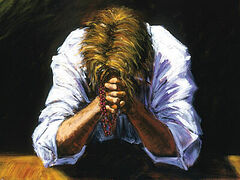The responsibilities of a Christian to his neighbor. Justice and its forms. Supremacy of Christian Justice. Christian Sternness and Indulgence. Christian Trust
Up to now, we have spoken about the responsibilities of a Christian to himself. Now let us examine his responsibilities to his neighbor, to other people.
The first step of a proper relationship with other people is the prerequisite of Justice. Without this basic need, even man’s kindness may become unhealthy if truth is not felt within it, if partiality and onesidedness are present. Various forms of justice may be seen in the very establishment of just relations between people.
Justice of loyalty
This is this lowest foam of justice, the most widespread in civil and government life. A loyal man tries to stand up in his life for the exact fulfillment of government and civil laws, obligatory for himself and others. Besides this, he ordinarily fulfills exactly and opportunely all his personal agreements and duties. But he does not take one step further than these legal norms and boundaries in the sense of conceding and condescending to others and may become dry, unresponsive, and heartless. Such a man does not act “unlawfully”, does not break laws, but will take his own and not concede anything to anyone, even if his neighbor will suffer as a consequence. Of course, in our time even such loyal people are relatively respectable, inasmuch as they honestly fulfill their duties. However, it is clear to everyone that such a relationship is insufficient for a Christian as it is purely pagan, and not Christian.
Justice of Correct Manners
This form of justice in moral relationships is considerably higher than the former. We call that man correct, who tries to comport himself as he should in his surrounding relationships, not only in external laws and customs, but in general, according to his conscience. Thus, he is measured, calm, polite, and attentive to everyone; he willingly responds to any requests and tries to do everything he promises, often freeing other people from difficulties. In contrast, to drily loyal people, it is easy and pleasant to live and work with such correct, attentive people. However, all such people are still far away from Christianity, inasmuch as their meekness and responsiveness are far from always being constant and truthful in themselves, but wilt and dry up in a short time, (“expire”, as it is said). Such a man may perhaps remain correct and courteous externally in his relationships to other people, but ordinarily tries to quickly and politely disengage himself from them, not tying himself up with their requests aid needs.
Christian Justice
This is the fullest form, of justice, the justice of a Christian heart. A fundamental, wise, and simultaneously clear and understandable principle is expressed in the words of the Holy Gospel, In everything do unto others as you would have than do unto you. (Matt. 7:12). The Apostolic Council repeats this in a negative form: “Do not do unto others what you do not wish for yourself”. Do not bring into life any falseness, nor lies, nor hurt, nor evil. All people are your neighbors, do not do anything to them which you do not wish for yourself. It is not enough rot to do evil only, but according to your conscience to do good, from your heart, receiving inspiration from the Holy Gospel’s law “of love, mercy, and all forgiveness. If you wish for people to relate to you from their hearts, yourself open your heart to your neighbor. Do not be an egotist, do not count your rights as loyal and correct people do, but place the good and health of your neighbor higher than all your rights, according to the Christian law of love.
Often, it happens that we are too indulgent with ourselves in life but demanding and strict with our neighbors. Christian justice says something different. But the Lord said, And why beholdest thou the mote that is in thy brother’s eye, but considerest not the beam that is in thine own eye? Or how wilt thou say to thy brother, Let me pull out the mote out of thine eye; and, behold, a beam is in thine own eye? Thou hypocrite, first cast out the beam out of thine own eye; and then shalt thou see clearly to cast out the mote out of thy brother’s eye (Matt. 7:3–5). Thus, Christian ascetics, grieving over their sins, were mercilessly stern and demanding with themselves but all forgiving, condescending towards others, covering the shortcomings of their neighbors with kindness and love. The Christian rule in life generally teaches us to search for the cause of grievous situations such as quarrels, unpleasantness and so forth not in others but within ourselves, in our love of sin, unyieldingness, self-love and egotism. In such a manner, Christian justice demands indulgence towards others from us. But even this is insufficient. Love summons us to see our brother in every person, our brother in Christ, the beloved creation and image of Almighty God. However far a man should fall, however much he darkens within himself the divine linage with sins and vices, we should always seek God’s spark in his soil as Dostoevsky was able to do in his Memoirs from the House of the Dead (from a hard labor camp). “Sins remain with sins, but the foundation in man is God’s image. Hate sin but love the sinner”, said St. John of Kronstadt.
Besides respecting the person of your neighbor, you also need to trust him. This is especially needed when a man, confesses his guilt with the words from the Holy Gospel, “I repent”, and promises to become better. How often is the kind intention of such a repenting person greeted with mistrust and coldness, so that the good wishes to improve disappear, replaced by resentment and, and the destructive decision: “Oh well, you just wait, I will show myself. I’ll have my revenge.” Who answers for the ruin of this soul? On the contrary, a sincere, loving Christian strives to greet the kind impulse of his brother with love, underlining his full trust and respect towards him, often supporting and confirming someone who is still shaky and unfirm on this good path. It often havens that having promised to improve, a person takes advantage of his brothers’ trust because of weak will or conscious wish to deceive him. But can this stifle the feelings of trust and well-wishing for one’s brother in a faithful Christian? For he is the son and follower of the law of Christian love, of that love which Beareth all things, believeth all things, hopeth all things, endureth all things… (1 Cor. 13:7), as the apostle said.







